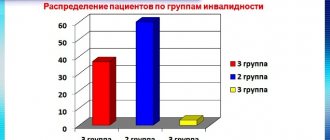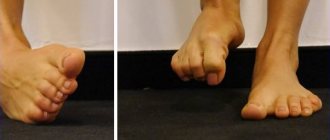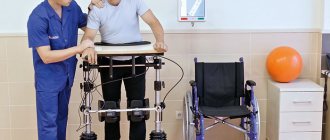Stroke is a complex disease directly related to disruption of cerebral blood flow that occurs as a result of blockage of blood vessels due to blood clots or growths, all of which leads to disruption of normal brain function and, consequently, to limited ability to work and life. As a rule, strokes happen to people of pre-retirement and retirement age, however, modern statistics show that this disease tends to “get younger”; every year more and more young people are susceptible to this disease.
Is a stroke a valid reason for disability?
Elderly citizens often face this problem, although the anomaly can also affect young people. In any case, experts divide stroke into:
- hemorrhagic, characterized by profuse bleeding of the brain, affecting most of it;
- ischemic, in which, against the background of minor hemorrhage, massive blockage of blood vessels is observed.
In both cases, a functional malfunction in the brain cannot be ruled out. For example, the following are diagnosed:
- paresis, paralysis;
- chewing dysfunction;
- decrease or loss of memory;
- deterioration in the ability to speak;
- visual abnormalities up to loss of function;
- problems with the musculoskeletal system.
One of the listed manifestations is often enough for experts to record the inability of the subject to take care of himself independently and his need for support (including from the state).
To cope with the consequences of the anomaly, exercise therapy, massage, and physiotherapy are used as rehabilitation. The more competent and quickly the health improvement measures were taken, the higher the chances of getting a light group.
How to care for a paralyzed person after a stroke
This situation cannot be taken lightly. Care should be regular and professional. The list of mandatory procedures includes taking medications to prevent a recurrent stroke. Massage and physiotherapy, sessions with a psychologist, rehabilitation therapist, and speech therapist are required. Speech restoration starts with the basics.
Rehabilitation in severe conditions is a complex and lengthy process. Care after a hemorrhagic stroke with irreversible consequences will be required for the rest of the patient's life. If all prescriptions are followed, some motor and speech functions can be partially restored, which will already improve a person’s life.
Who is eligible for disability after a stroke?
The disease in question is included in the list of health problems that qualify for special status. But according to the law, in addition to diagnosis, ITU experts must observe a serious limitation of capabilities (at least one). That is, in case of successful rehabilitation, they are not sent for examination.
The question of establishing a group becomes relevant only if there is no positive result from treatment or if the prognosis is unfavorable (there is a risk of a second strike, etc.).
Answers to frequently asked questions
Below we provide answers to the most popular questions.
Can I apply for benefits for caring for a disabled child if I myself am disabled?
The rules for assigning benefits for caring for disabled children are contained in Decree No. 175 of the President of the Russian Federation “On monthly payments to persons caring for disabled children.” The recipient of payments must satisfy a number of requirements:
- be able to work;
- not officially work;
- not be registered with the Employment Center;
- not receive a pension.
If you have a disability, it will not be possible to arrange care for a disabled child. It is best to give permission for these actions to a person (relative or friend) who meets the above requirements.
Determination of disability group after stroke in 2021
During the medical and social examination (MSE), doctors, before making a decision on assigning a group, take into account a number of criteria, the degree of loss of various opportunities, and more:
| Disability group | Degree of lesions | EDSS score | Characteristics |
| Third | 40-60% | 3,0-4,5 |
|
| Second | 60-80% | 5,0-7,0 | Despite the presence of persistent impairments, the patient is able to take care of himself. Work skills are often retained. |
| First | >80% | 7,5-9,5 |
· Requires constant care from another person. |
In the process of examination, in addition to the state of health, the social component of the subject’s life, conditions, etc. are taken into account.
Criteria for establishing a disability group
Disability group I is assigned to severe visible impairments in the functions of movement and self-care. The second disability group is assigned to patients who have obvious impairments in the functions of movement, communication, orientation, behavior control and self-care of the second degree. Patients with mild impairments of mobility, ability to work and first degree can apply for assignment to the third disability group.
During the re-examination, experts take into account whether the patient will be able to return to work if his health improves. If, within five years, disabled people of the first or second group do not experience improvement, disability is established without an expiration date.
If the patient has been refused recognition of disability, he can file an application to appeal the decision of the MSEC. The patient always retains the right to an independent examination. To do this, he can go to court, however, the decision received after the court can no longer be challenged.
Citizens are assigned a disability group without specifying a period for re-examination, and citizens under 18 years of age are assigned the category “disabled child” until the citizen reaches the age of 18:
- no later than two years after the initial recognition as disabled of a citizen who has diseases and defects, irreversible morphological changes, dysfunctions of organs and systems of the body;
- no later than four years after the initial recognition of a citizen as disabled, if it is revealed that it is impossible to eliminate or reduce during the implementation of rehabilitation measures the degree of disability caused by persistent irreversible morphological changes, defects and dysfunctions of organs and systems of the body.
Call and they will make an appointment with a neurologist. Specialists at the Yusupov Hospital use the most effective medications, individual treatment and rehabilitation regimens to minimize the consequences of ischemic stroke. Most patients return to work and do not need to be assigned a disability group.
Prohibition on certain types of work activities
The right to work remains despite the special status, although the recipient must work taking into account his capabilities and medical recommendations. After a stroke, it is usually advised to avoid:
— harmful working conditions;
— psychological stress;
- standing on your feet for a long time;
— low temperatures for many hours;
In general, before employment, a worker with a disability should assess all risks to avoid recurrent stroke.
Limitations in work activity after a stroke
Of course, intensive work activities are contraindicated for all patients who have suffered a stroke. We list the most commonly used restrictions:
- elimination of psycho-emotional and heavy physical stress is required;
- do not work under conditions of sudden temperature changes and vibration loads;
- any interaction with toxic and harmful substances is excluded;
- It is prohibited to carry out activities in a prolonged forced position of the body in tension, especially regarding the neck and head.
When considering the restrictions in a patient’s work activity after a stroke, first of all, the complications that arose as a result of the disease are taken into account; it is also necessary to assess his capabilities and limitations in his life.
Basic benefits when receiving disability
A special status caused by a stroke provides benefits and cash payments. The amount of assistance provided is similar to what is guaranteed to other citizens with disabilities:
| Types of benefits | Examples |
| Financial | 1. Payment of benefits according to the established group. 2. EDV. 3. Additional payments depending on various conditions: regional, for dependents or up to the subsistence level. |
| Tax | A discount on tax payments or their complete cancellation. |
| Housing | 1. Providing real estate for ownership or lease. 2. Subsidizing payment for housing and communal services. 3. Compensation for 50% of the amount spent on utility bills. |
| Social | 1. Free travel on public transport. 2. Job quotas. 3. Discount on purchasing train tickets. 4. Admission to a university under special conditions. |
| Medical | 1. Extraordinary care in hospitals. 2. Issuing prescription medications free of charge. 3. Free trip to the sanatorium. |
If the problem has caused paralysis, visual, auditory or other anomalies, the necessary devices (hearing aid, cane, etc.) are provided to compensate for lost capabilities. But special TSRs specifically for stroke patients are not provided.
One-time disability benefit
A one-time cash payment to disabled people is financial support from the state, which can be expressed both in cash and in kind. A person has the right to choose the form of a one-time benefit.
What is included in EDV in kind:
- city telephone service;
- travel to the sanatorium once a year;
- social services;
- Dental prosthetics once every 5 years.
In material equivalent, EDV is paid in an amount depending on the disability group:
- for the first group – 4,087.36 rubles;
- for the second group – 2,919.02 rubles;
- disabled person of group 3 – 2,336.70 rubles;
- minor citizens – 2,919 rubles. (the amount does not depend on the group).
The recipient has the right to refuse assistance in kind in full, or from any specific type of service, replacing it with cash support.
Registration process
First of all, the attending physician or social security representative must refer the patient to a medical examination. Only the officially recorded diagnosis is considered, medical records are taken into account. maps and present lesions.
You can apply for the group after your condition has stabilized, that is, when at least 4 months have passed since the impact. If there are grounds for assigning a disability, the doctor first sends you for tests and examinations and only after that sends you to an ITU.
List of documents
According to the law, a potential beneficiary presents to the ITU Bureau:
— your SNILS and passport;
— application form 088/у-06;
— extracts from the medical history;
- referral for examination.
A reference from the place of work is attached if the person being examined was employed before the illness.
Where to contact
With the prepared documents on a specific day, you should appear for a commission at the ITU bureau (by registration or by type of illness - there may be such departments in the regions).
Refusal to provide a certificate of disability
The inspection procedure involves assessing:
— general condition;
— degree of deterioration of capabilities;
— the impact of the problem on the quality of life.
After the inspection, questioning, and study of documents, the commission members deliberate, vote and notify the examinee of their decision. The status may not be assigned when:
— criteria have not been identified that would allow establishing even the easiest group 3;
- the documents are fake (here it can even lead to a criminal case).
How to appeal an ITU decision
If a negative decision is regarded as violating the rights of the beneficiary, you can appeal the ITU result step by step. To do this you should:
- seek new direction;
— provide a package of papers to a higher bureau;
— repeat the health assessment procedure.
If you refuse again, you can go to court. Additionally, the involvement of an independent expert is allowed.
How to apply for disability
How to apply for disability
- Obtain a referral to an ITU or a certificate of refusal to be referred to an ITU (from a medical organization, from a pension agency, or from a social security agency);
- Prepare identification documents: a passport of a citizen of the Russian Federation, a temporary identity card of a citizen of the Russian Federation, issued before issuing a passport, or their certified copies.
- Prepare a written application for an ITU.
- Contact the ITU office at your place of residence or place of stay with a package of documents: an identity document, an application for an ITU, a referral to an ITU or a certificate of refusal to refer, medical documents confirming a health impairment.
- Wait for an invitation to ITU.
- Go through a medical examination and get a decision.
- Obtain a certificate confirming the fact of disability.
What to do if referral to ITU is denied?
If you are denied a referral to the ITU, you must be issued a certificate of refusal to refer to the ITU, which gives you the right to submit documents to the ITU yourself without a referral (clause 19 of the Rules for recognizing a person as a disabled person, approved by Decree of the Government of the Russian Federation of February 20, 2006 No. 95)
.
What to do if the patient is unable to come for examination to the ITU facility?
If the recipient of a public service cannot come to the bureau and it is necessary to conduct an MSE at home, an appropriate conclusion from a medical organization providing medical and preventive care is additionally submitted (clause 90 of the Regulations for the provision of public services for conducting a medical and social examination)
.
How is disability determined?
When establishing disability, a quantitative assessment of the severity of persistent dysfunctions of the human body due to neoplasms is taken into account. It is based primarily on the assessment of local prognostic factors: localization and size of the tumor, anatomical form of growth, growth rate, degree of invasion of the organ wall (degree of invasion), histological structure and degree of differentiation, degree of malignancy, nature of damage to regional lymph nodes, presence or absence of distant metastases , stage of the tumor process (according to the TNMG system). The possibility of adaptation and compensation, and the presence of complications are also taken into account.
(Order of the Ministry of Labor of Russia dated December 17, 2015 N 1024n (as amended on July 5, 2016) “On classifications and criteria used in the implementation of medical and social examination of citizens by federal state institutions of medical and social examination" (Registered with the Ministry of Justice of Russia on January 20, 2016 N 40650 ) Registered with the Ministry of Justice of Russia on January 20, 2021 N 40650)
What is IPRA for a disabled person?
IPRA for a disabled person is a set of optimal rehabilitation measures for a disabled person, which includes certain types, forms, volumes, terms and procedures for the implementation of medical, professional and other rehabilitation measures aimed at restoration, compensation for impaired body functions, formation, restoration, compensation of the disabled person’s abilities to perform certain types of activities.
How to make changes to the IPRA of a disabled person?
If it is necessary to make additions or changes to the disabled person’s IPRA, a new referral for medical and social examination is issued and a new disabled person’s IPRA is drawn up.
Is an employee obliged, after his disability group has been determined, to inform the employer about this?
The employer is not legally required to provide documents confirming his disability. An employee can submit such documents at his own request, both when applying for a job and during his work activity.
Can an employee refuse the rehabilitation measures specified in the IPRA?
The employee has the right to refuse one or another type, form and volume of rehabilitation measures specified in the IPRA (IPR), as well as the implementation of the program as a whole. In this case, the employer is released from liability for its implementation. (Part 5 of Article 11 of Law No. 181-FZ, Part 7 of Article 11 of Law No. 181-FZ.)
What rights does a disabled person have at work?
- Duration of working hours of disabled people and payment for their work - no more than 35 hours per week with full pay (for disabled people of groups I and II);
- Involvement of disabled people in overtime work, work on weekends, holidays, and also at night is allowed only with their written consent and provided that this is not prohibited for them for health reasons in accordance with a medical report;
- The duration of annual paid leave for disabled people has been increased and must be at least 30 calendar days (Part 5, Article 23 of Law No. 181-FZ)
; - The employer is obliged to provide a disabled employee, upon his written application, leave without pay for up to 60 calendar days per year (paragraph 5, part 2, article 128 of the Labor Code of the Russian Federation, letter of Rostrud dated 04/16/2014 N PG/3387-6-1)
; - The employer is obliged to create and equip (equip) special workplaces for the employment of disabled people. (Part 1 of Article 22 of Law No. 181-FZ.)
; - Establishment of easy labor for disabled people.
If a disabled person, in accordance with the IPRA, can no longer work at his previous job?
An employee who needs to be transferred to another job in accordance with a medical report with his written consent, the employer is obliged to transfer to another available job that is not contraindicated for the employee for health reasons (Article 73 of the Labor Code of the Russian Federation)
, the employee retains the same average earnings for one month from the date of transfer.
Also, according to clause 9 of the Rules for recognizing a person as a disabled person, approved by Decree of the Government of the Russian Federation of February 20, 2006 No. 95
, disability of group I is established for two years, and disability of groups II and III - for one year. Thus, if a disabled employee who needs easier work has provided the employer with documents confirming the establishment of disability for a specified period, a temporary transfer is issued.
If an employee refuses to be transferred to another job in accordance with his medical report?
If, in accordance with a medical report, an employee needs a temporary transfer to another job for a period of more than four months or a permanent transfer, then if he refuses the transfer or the employer does not have a suitable job, the employment contract is terminated in accordance with clause 8 of Part 1 of Art. 77 Labor Code of the Russian Federation. In this case, the dismissed employee is paid severance pay in the amount of two weeks' average earnings (Part 3 of Article 178 of the Labor Code of the Russian Federation).
What is VMP and how much does it cost?
VMP – high-tech medical care.
VMP is provided in accordance with the List of types of VMF included in the basic compulsory medical insurance program and the List of types of VMF not included in the basic compulsory medical insurance program. Regardless of the type of medical care, it is free, since it is included in the Program of State Guarantees for the provision of free medical care to citizens and is financed by the Federal Compulsory Medical Insurance Fund.
How to get high-tech medical care?
Step 1. Contact your doctor.
Step 2. Wait for the VMP coupon to be issued.
Step 3. Wait for the decision of the commission of the medical organization providing medical care and hospitalization in the receiving medical organization.
Step 4. Upon completion of VMP, receive recommendations.
How to find out the status of a VMP coupon?
The status of the coupon can be viewed on the official website of the Russian Ministry of Health:
What to do if a doctor refuses to refer a patient for advanced medical care?
- Submitting an application or complaint to another authorized person of the referring medical organization;
- Filing an application or complaint to Roszdravnadzor or the government body of a constituent entity of the Russian Federation in the field of healthcare;
- Contacting a medical insurance organization or territorial compulsory medical insurance fund;
- Applying to the court to declare illegal the inaction of medical workers or refusal to refer for the provision of medical treatment.
What is the validity period of the quota and where can I get it?
The quota is issued by the health department at the place of residence in a specific medical institution and is valid from the moment of its issuance until December 31 of the current year.
Will the quota be valid for re-hospitalization?
If you are hospitalized again, you must take a new quota for treatment, even if hospitalization is planned for the current year.
What to do if there is a prescription, but the pharmacy does not have the medicine?
You need to fill out a prescription for deferred care at the pharmacy. There they are required to register it in the register of unsatisfied demand. Such a magazine should be in every pharmacy that dispenses drugs on preferential prescriptions. After registering a prescription, the pharmacy must submit a request for the drug to the pharmaceutical company authorized to supply preferential drugs to the region and provide the drug to the patient within 10-15 days. Deferred care is not a pharmacy's choice—it is the pharmacy's legal responsibility to arrange deferred care.
Prescriptions are issued with a validity of 30 days. Can a prescription be issued for a longer period of validity?
Prescriptions for medications written out on prescription forms Form N 148-1/u-04 (l) and Form N 148-1/u-06 (l), citizens who have reached retirement age, disabled people of the first group, disabled children, and also for citizens suffering from chronic diseases requiring long-term course of treatment, valid for 90 days from the date of issue.
For the treatment of chronic diseases, the specified categories of citizens can be issued prescriptions for medications for a course of treatment of up to 90 days. (Appendix No. 1 to the order of the Ministry of Health of Russia dated December 20, 2012 No. 1175n)
IMPORTANT MEDICATION INFORMATION!
1. Decree of the Government of the Russian Federation of July 30, 1994 N 890 (as amended on February 14, 2002) “On state support for the development of the medical industry and improving the supply of medicines and medical products to the population and healthcare institutions”
2. Order of the Ministry of Health of Russia dated December 20, 2012 N 1175n (as amended on April 21, 2016) “On approval of the procedure for prescribing and prescribing medications, as well as forms of prescription forms for medications, the procedure for processing these forms, their recording and storage”
3. Federal Law of July 17, 1999 N 178-FZ (as amended on December 19, 2016) “On State Social Assistance”
4. Federal Law of November 21, 2011 N 323-FZ (as amended on July 3, 2016) “On the fundamentals of protecting the health of citizens in the Russian Federation”
5. LIST OF VITAL AND IMPORTANT DRUGS FOR MEDICAL USE FOR 2021 (Approved by Decree of the Government of the Russian Federation of December 28, 2016 N 2885-r)
Peculiarities of assigning disability in non-standard cases
Since after a stroke the consequences can be very unpredictable, various nuances are taken into account when establishing disability. Let's take a closer look at them.
Pensioners
Preferential status in this case is formalized in the same way as when examining other patients. That is, the requirements are similar to those described above. The only significant difference is the ability to immediately receive a group for life. In any case, after being assigned a disability, the pensioner must additionally contact the Pension Fund to recalculate the pension.
Unemployed
The health of citizens who do not have a permanent place of work is assessed by specialists according to standard criteria for all. It’s even a little easier for the unemployed, since they don’t have to wait 4 months and apply for sick leave like employed people. But without work experience, you are only entitled to a social disability pension.
Bedridden patients
In difficult situations, when a potential beneficiary is not able to visit the ITU office, there are several options:
— carry out a health check at home or in a hospital;
— make a decision based on the medical history and other documents without the patient’s personal presence.
Types of disability benefits
People who are unable to work due to disability are provided with the following types of financial support:
- The social pension is intended for those who have not accumulated insurance coverage. Can be received by minors, pensioners, citizens who have lost their breadwinner.
- A labor pension is assigned as compensation for the lost opportunity to receive income. To receive this type of payment, you must have a minimum length of service – at least 1 day.
- The state pension is accrued depending on the length of service to cosmonauts, military personnel, victims of man-made accidents, participants of the Second World War, as well as survivors of the blockade.
Loan secured by PTS CashDrive, Person. No. 18-034-75-009039
from 0.05%
rate per day
up to 1 million
90 – 2,555 days
Take out a loan
Re-examination
If the disability is not permanent and requires periodic confirmation of the group, the beneficiary is required to undergo another examination before the certificate expires. In addition, the condition assessment process may be caused by deterioration in performance.
Be that as it may, the criteria established by law are always considered and taken into account. And if you miss the moment when the certificate expires, your pension and benefits will be cancelled.
| Disability group | Validity period of the certificate |
| First, second | 2 years |
| Third | 1 year |
By the way, if your health deteriorates significantly, you can even reconsider the indefinite group.
Amount of benefits for disabled people since childhood
- Social pension: 1st group – 13,454 rubles, 2nd group – 11,212 rubles, 3rd group – 4,756 rubles.
- EDV: 1 group – 3897 rub., 2 – 2783 rub., 3 – 2228 rub.
There is also a disability benefit in case of loss of a breadwinner. Its size depends on the breadwinner's insurance pension.
Persons disabled since childhood have the right to the same benefits as persons who have become disabled during their lifetime.
Online loan on Zaymigo card, Persons. No. 004400
from 1%
rate per day
up to 30 thousand
1 – 30 days
Take out a loan








